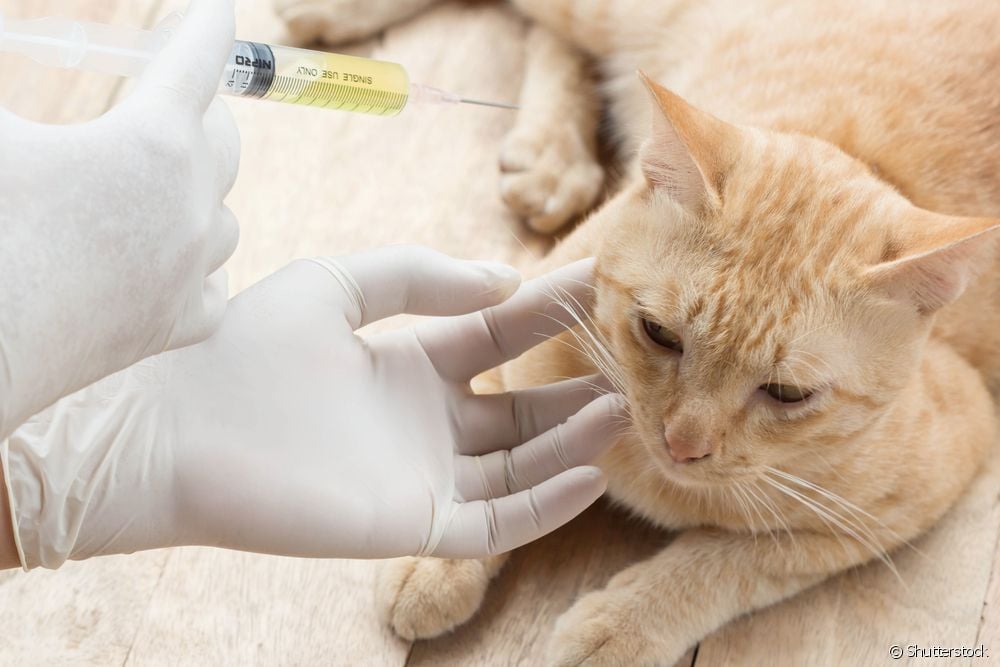Quadruple feline vaccine: learn all about this immunization that cats need to take

Table of contents
Cat vaccinations are essential to keep your pet safe from common diseases. Some say felines have seven lives, but health is no joke! Immunization ensures the well-being and longevity of your kitty, who will be free from many serious illnesses. Just like deworming and parasite control, such as fleas, vaccines need to be given regularly. One of them is thefeline quadruple vaccine (also known as polyvalent V4), which fights four types of viral diseases. To help you, we have prepared a material with all the information you need to know about this immunization. Enough more!
Quadruple feline vaccine: what diseases are prevented with immunization?
The V4 cat vaccine protects against four disease viruses that can be fatal to cats:
- Feline chlamydiosis: the disease affects the cat's eye region and respiratory system. Conjunctivitis-like symptoms and rhinitis flare-ups are the most common signs. The disease is contagious among cats and can also be transmitted to humans. It is caused by the bacterium Chlamydia psittaci;
- Feline calicivirus: the disease also affects the respiratory tract of cats (it can also affect the eyes and digestive system) and is highly contagious. Nasal discharge, sneezing and coughing are the most common symptoms;
- Feline panleukopenia: Popularly known as cat distemper, this disease is very serious and affects the animal's immunity with a decrease in white blood cells. The most common symptoms are dehydration, jaundice (yellowish coloration of the skin and mucous membranes), diarrhea, vomiting and anorexia;
- Feline rhinotracheitis: Similar to human flu, this disease also affects the feline respiratory complex. Sneezing, fever, apathy, intense nasal and eye discharge are the main signs.
There is also the feline quintuple vaccine, which protects the animal from all these diseases and includes immunization against FeLV (feline leukemia). The difference between vaccines is determined by the amount of antigens present in the composition. When in doubt, talk to a trusted veterinarian so that he can indicate the best one for your kitten.
Vaccines for kittens should be given in doses and at intervals
- The first dose of the polyvalent should be given when the cat is about 60 days old;
- After the first dose, the next ones need to follow an interval of 21 to 30 days. That is, the cat will take the second dose of the polyvalent when it is about three months old;
- When the animal is due for its third and final dose of the polyvalent, it will also be immunized with the rabies vaccine. This occurs when the animal is approximately 120 days old;
- The polyvalent vaccine (V3, V4 or V5) and the rabies vaccine are mandatory immunizations that need to be reinforced annually.

Vaccine: adult cat also needs to be immunized with V4
If you have rescued or adopted an adult cat, it is important that it undergoes the same immunization protocol. The feline quadruple or feline quintuple vaccine can be taken at all ages. In any case, the cat needs to be healthy and without occurrence of diarrhea, vomiting or any other disease that can affect its immunity.
Since the adult cat's immune system is already formed, he can take the vaccine in one dose or follow the same vaccine cycle as the kittens. The difference here is that the adult cat needs to take the rabies vaccine as soon as he receives the first dose of the polyvalent. Talk to your veterinarian so that he can determine the best immunization protocol for your feline.
See_also: "My dog destroys everything": what to do and how to direct the pet's behavior?
